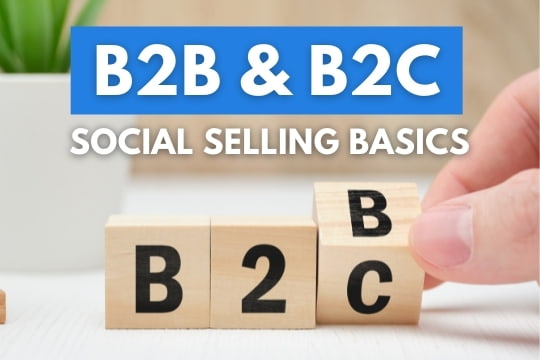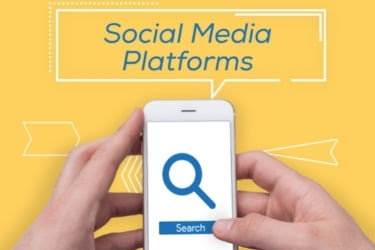
Now that social media has become part of widespread business norms. It’s essential to understand the distinctions between B2B and B2C social selling and how they affect purchasing decisions. Both processes help raise brand awareness, but a key difference is B2B focuses more on informative rather than persuasive communication. Here's a deeper look at the differences between B2B and B2C social selling.

The concept of social selling involves using your expertise on social media to craft content and answer questions for curious followers. It's an excellent way to attract, nurture and develop new leads and then send them to your website for deeper information. Establishing yourself as a knowledgeable authority on your topic with a blog helps Google identify and index your content as meaningful. Once Google thinks your site is legitimate, the search engine will help connect you with target followers.
Your sales team should be aware that the top social networks that bring success to B2C firms are Facebook, Twitter, Instagram, and YouTube. But when it comes to B2B marketing, the leading platform is LinkedIn, followed by Twitter and Facebook. Businesses should look at their websites first to analyze what attracts specific market segment followers to their sites.
The content and the purpose of social marketing differs between B2B and B2C. While B2B is about developing long-term relationships to serve companies with their needs, B2C is more of a personalized experience for consumers to pursue their desires. The goal of B2B marketers is to increase awareness and engagement with business prospects, whereas B2C is simply a process that takes out the middleman. Both methods create greater conveniences for buyers.
Different social platforms serve different purposes when it comes to sales and marketing. Each of the major social platforms earns its revenue from advertising. Using a social media platform such as LinkedIn allows for a personalized exchange of professional content, fuels further engagement. It helps before engaging in B2C social selling to research which social networks your customers are already using.
Even though B2B and B2C social selling have become unstoppable trends, telemarketing is still faster for closing sales deals. The phone is beneficial in accelerating business sales since it provides real-time answers to questions that might be holding up purchasing decisions. While typical consumers no longer like answering the phone for telemarketers, whom they view as invasive strangers, B2B customers have more definite reasons to engage on the phone with marketers, especially if they already have a familiar relationship.
But B2B marketers should first weigh the benefits of telesales and the disadvantages before deciding on a specific strategy. Telemarketing still works if you can get people to answer the phone, but many people now avoid answering calls if they believe it's a telemarketer.

Building relationships with B2C is essential, but it usually doesn't compare with the level of personalization required to move B2B sales. Both types of sales involve building trust, but the business-oriented buyer usually must be convinced with a lot more product or service information than what a typical consumer requires. That's because a business decision-maker is generally held accountable to a boss who expects purchases to be carefully scrutinized and justified. The average consumer doesn't have to face that type of pressure.
The magic of online lead generation can be engineered in various ways, but it generally starts with publishing informative content that your audience is already looking for. Engaging in social listening is a valuable social engagement technique that both B2B and B2C can utilize. Social listening is the practice of using tools that track brand mentions on social networks. These tools can drive you toward engaging with prospects and giving them the answers they're looking for.
Online reviews have become monumental in promoting online products and services. That's why it's essential to include a series of positive reviews on your site. In many ways, online reviews are the most reliable factors that stimulate leads. According to a recent Demand Generation Report, 70% of B2B marketers say warm referrals are the best and fastest types of leads to close. Additionally, 92% of B2B buyers trust industry thought leaders in their research involving purchasing decisions.

B2C cannot be conducted the same way as B2B sales because consumers are typically sold products and services based on emotional value. The products they seek give them emotional satisfaction that may involve solving a household problem or participating in a current trend. Businesses, by contrast, must often look beyond trends to resolve more complex and practical issues that directly affect the bottom line. While B2C customers primarily focus on their tastes, B2B has a broader scope for considering purchases than providing ROI.
So the sales techniques will differ between the two types of marketing. B2B buyers simply engage in a longer decision-making process than B2C buyers. While businesses must answer to upper management and an accounting department, consumers typically make purchasing decisions for themselves. One of the most overlooked yet most powerful techniques for using social media to promote business is to establish a customer service page through a social media portal. Giving customers easy ways to interact with your brand in real-time can generate endless leads.
Be aware that B2B social selling aims at generating leads with minimal sales pressure, whereas B2C social selling is more about fostering engagement with minimal sales pressure. LinkedIn has proven to be an effective platform for sharing business ideas and bringing business minds together. In contrast, Facebook and several other mainstream social networks are typically used more casually. At the same time, Any social media platform can be used for business reasons. But LinkedIn has a more serious tone with an expectation of sharing career details.

When it comes to B2C social selling, you mainly need to focus on target marketing for specific market segments, which can be achieved with mainstream platforms such as Facebook and Twitter. Meanwhile, B2B marketers often focus on LinkedIn as 78% of marketers say LinkedIn is the most effective B2B platform for generating leads. Here are important takeaways for maximizing digital marketing within the social realm for attracting either businesses or consumers:
A primary key to successful B2C social selling is creating a seamless eCommerce experience. Online consumers are often ready to buy with their smartphones, but if the website is clunky or the checkout process is lengthy, buyers get suspicious and restrain from purchasing. B2C marketers must invest in an eCommerce solution that delivers quick and painless results to get past this hurdle. The more simple the purchasing process, the more likely consumers will recommend the brand to friends. Here are other valuable tips for social selling:

If your digital marketing targets the audience that uses social media the most, focus on the 25-34 age group for males and females. They make up the most significant percentage of daily social media users, accounting for 12% of females and 13% of males.
It's important to note that B2B social selling is an incredible improvement compared with last century's business marketing methods of buying lists, engaging in cold calling that takes up precious time and accumulating vast amounts of useless data. Social media creates greater efficiencies by saving time and money for businesses. While B2C campaigns tend to be generic, B2B selling is more of a one-on-one form of communication.
Whether you engage in B2B or B2C social selling, it's imperative to keep personalization in mind as a prevalent theme. The combination of a robust social media platform and a social selling strategy leads to prosperous lead generation. Social media is undoubtedly a big part of the modern marketing puzzle that delivers clear solutions for sales. Find out more about how e_marketing helps buyers reach purchasing decisions as well.
B2B stresses informative, relationship-building communication aimed at decision makers, while B2C relies on persuasive, emotion-driven content that moves individual consumers quickly toward purchase.
LinkedIn is the primary channel, with Twitter and Facebook offering added reach. LinkedIn's professional focus makes it ideal for sharing expertise, connecting with decision makers and nurturing long-term business relationships.
Phone calls deliver immediate answers, accelerate deal cycles and let salespeople address complex objections in real time. B2B buyers, already evaluating high-stakes purchases, are often willing to talk if trust exists.
Positive reviews act as social proof, boosting credibility and guiding prospects toward conversion. They often outperform ads because buyers trust peers and industry voices more than brand messaging, especially in high-value B2B deals.
Personalization shows prospects you understand their specific goals. In B2B it means tailored insights and one-on-one dialogue; in B2C it means seamless, convenient shopping experiences and targeted content that matches individual interests.